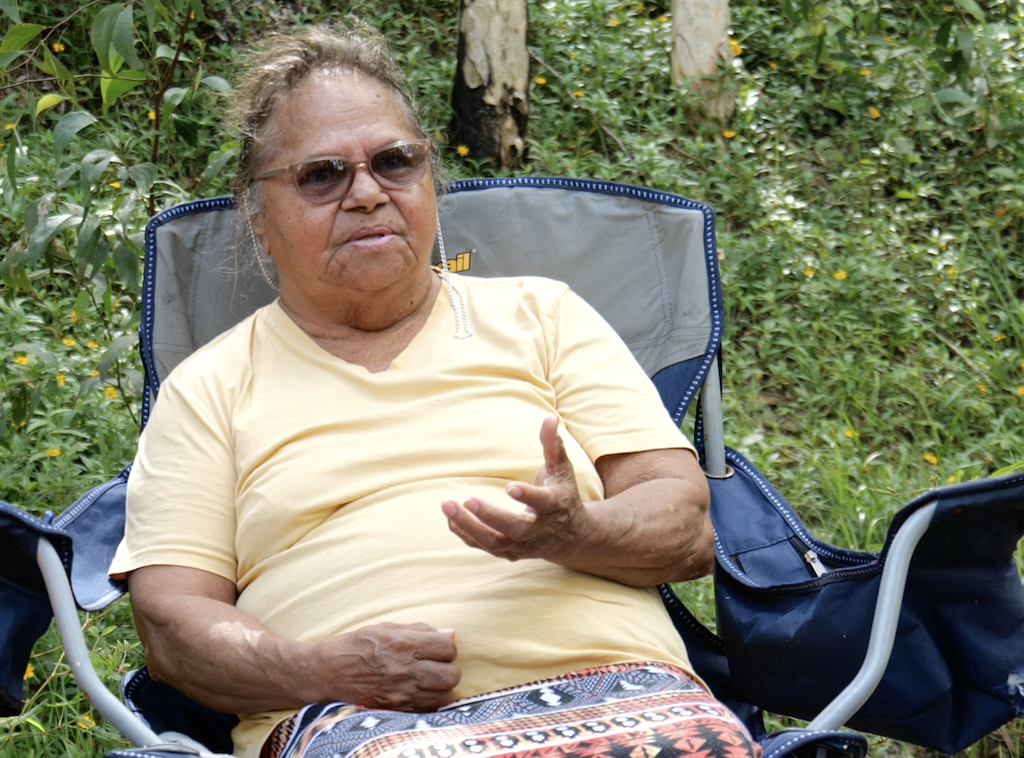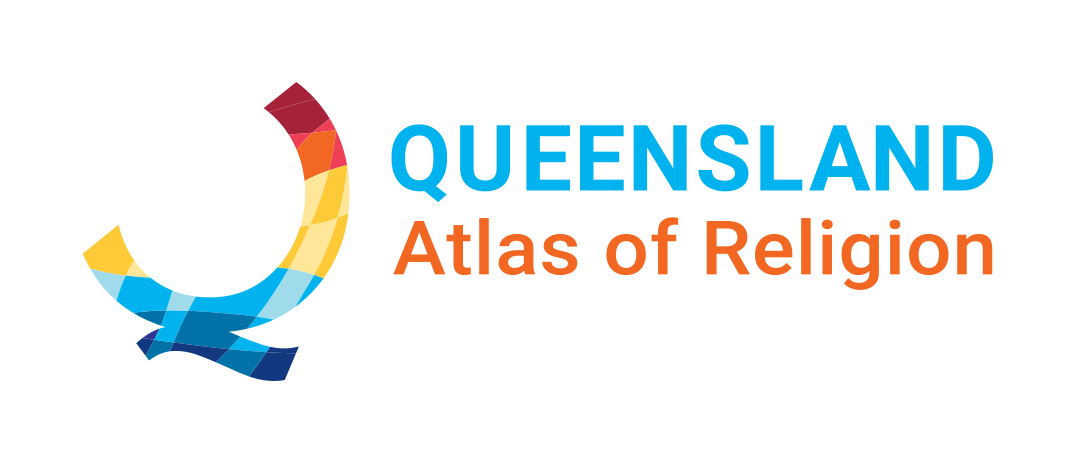Dorita Murgha Wilson
My mother Dorita is an ordained minister in the Anglican Church. Talking to her about her life at Yarrabah, we hear how she reconciled Christianity with her culture and identity as an Aboriginal woman.
By Elverina Johnson
This is an 8 minute read and a 25 minute video, published December 2024.
From as far back as I can remember as a young child in the mid-1970s, I have always known and seen my mother involved in the church ministry at St Alban’s Anglican Church, Yarrabah. She was born in 1944 and became a Christian in 1975. From then on, she committed her life to service to the church and to her faith as a Christian.
Dorita was introduced to Christianity by the Rt. Rev. Arthur Malcolm, an Aboriginal man, and his wife Colleen, a non-Indigenous woman. Rev. Malcolm was a new Anglican priest and a Captain in the Church Army of Evangelism when my mother became a Christian. He and his wife became great supporters and mentors for my mother throughout her Christian journey.
Unlike her father, grandfather, and great-grandfather, becoming a Christian for my mother meant being ‘born again’ rather than baptised in the Church. When I interviewed my mother in March 2023, I asked her about her life in the Church, and how she saw the relationship between Aboriginal culture and Christianity.
‘Culture wasn’t allowed’: early memories
I asked her to reflect on how Aboriginal culture was thought about when she was young. She told me:
Culture wasn’t allowed in the school at that time, back then. We weren’t allowed to speak about our culture. We wasn’t allowed to learn our traditional language. And it was barred from school at that time, so we have to come under white man law and learn their way of speaking, thinking, and living. To me, I could see that they didn’t agree with us, talking about our culture, and our traditional ways of living. My culture is my identity and, I’m a black person, a black woman, and I belong to this land.
On weekends, my parents, and my younger siblings used to go out on weekends, go around the bay, and go camping. And that was our time to sit and listen to my father, who was a Gunggandji man, one of the tribal men of the place, Yarrabah. We had to learn. He taught us how to do things. Go out in the bush and look for special trees that he would cut branches off. We had to take it back and make the fire. We had to learn how to make the fire and sit there and watch him. While sitting around the fire he would say, “you sit here and I’m gonna teach you how to make a boomerang.” And detail by detail he showed us what to do, and how to carve that boomerang out. It was a mangrove tree that we made the boomerang from.
In this way my mother explains the importance of Aboriginal culture to her identity, and even though there were rules and regulations around practicing culture, it was still maintained and taught outside the white Australian institutions, including at home and on Country with her father.
However, because of the distorted teachings about Aboriginal culture, my mother felt ashamed. She told me that because it was taught to her that culture was wrong:
In my early teenage life growing into maturity, I really didn’t like my culture. I turned against it in some way because of how I used to see my ancestors, and my elders demonstrating, fighting for land rights and I felt that wasn’t the way I wanted to go. And so because I thought, well, this is no good for me, I don’t want to be involved in what they were doing, so I cut myself off from that and I just didn’t want to be connected with my culture.
I didn’t want to be known as Indigenous, an Aboriginal person. We have Aboriginal people that have the shame, shame way, you need to have shame. And so I felt that way. It made me ashamed of who I am. As I matured on I heard more about my culture and my father used to speak in our Gunggandji language. He would tell us about our culture, and how important it was. And because it’s part of our identity, and to keep it so that it would pass it on to the next generations, my family, and my children.

Figure 1: Dorita Murgha Wilson, Yarrabah, March 2023 (QAR).
My mother explains how she thought it was wrong to be Aboriginal, due to the underlay of conflict between practicing culture and fighting for land rights and being a Christian. She felt that because Christianity spoke about forgiveness and kindness and living in a better way, those values were different to fighting for land rights and culture. Aboriginal activism was not the Christian way, as some aspects of the demonstrations did not agree with her Christian values. She felt that Christianity required her to deny her rights.
‘Lights in the church’: finding a connection
At this time, she was a Christian having grown up with Christian values taught by her father and mother, but she had not thought about the connections nor the conflicts between being a Christian and being an Aboriginal woman. She told me:
As I was growing up my foundation was always a Christian foundation. My mother was always close to the Lord and talking about God and giving us directions. I used to go to church. And I used to walk from where we were living, down to the church even though there was no electricity along the streets, but there were lights in the church from the diesel engine. When I was going down to the church, I really didn’t know why I was going to church. I wasn’t really connected to God at the time. I would just go and listen. The thing that really got to me was the old hymns that they were singing and I used to love listening to the them singing those hymns. That’s why I suppose today I always like singing, and I became a singer.
As she grew older, however, she developed a new interpretation of faith and the relationship between Aboriginal culture and identity and Christianity.
I remember what my father said, that God’s name is Giaburra in Gunggandji language … God is the Creator. And he has given us our culture.
For me, I thought becoming a Christian meant that I had to stop being an Indigenous person. But that was not the case. When I came to the stage of acknowledging God, who he is, and remembering what my father said, that God’s name is Giaburra in Gunggandji language. I learned in the Bible that our culture and God connects. Because God is the Creator. And he has given us our culture.
After hearing from my father that we had a Gunggandji word for God or Creator, I wanted to learn more about this God, and get to know his son Jesus. And… one day I went and I was invited to a prayer group. And my mother Hilda used to go down to prayer meetings every week. And she said to me “Dorita, I think you should come to church. Come and learn about God.” And I said “well, no, mum. I don’t want to learn about God. Because God is not for me. Because I’m a young woman. I’m a young person. God is only there for people like you, old people.”
And she said “well, God is for anybody. God is for everybody.” And so I thought on the words that she was saying to me, that God is for everyone, and anyone. And then one day I made up my mind to go with her, took up her invitation and go to church. I started to hear about what God was saying, and started to read the Bible, God’s word … I really got interested and I wanted to learn more so I was happy. I went to church again and the Minister, Fr. Arthur Malcolm, and his wife Colleen explained to me about being born again.
‘A daughter of Giaburra’: making a change in life
After hearing about what being born again meant, my mother remembers thinking, “I want to be born again. I want to make a change in my life … And so I accepted Christ into my life. And that was my born again experience. I felt happy. Because after becoming a born again Christian, a change came in my life. Because knowing that Jesus has changed my life, and I was so happy, knowing that I’m a daughter of Giaburra, God, becoming a child of God.”
My mother refers to the concept of being ‘born again’ as it was told to her by the Aboriginal minister Rev. Arthur Malcolm and his wife. This was a new concept which my mother felt offered a deeper connection to Christianity, which allowed her to accept Christ, and a new way of living, while also accepting that Aboriginal culture was part of who she was; culture was God-given.
Oral history interview: Dorita Murgha Wilson
My mother’s story indicates that she thought that becoming Christian meant she had to stop being Indigenous. It does not surprise me that she thought this, considering this was what our ancestors were told. They were told to follow the Christian way and the church and stop practicing culture or you will be punished. Culture was deemed as evil practice by the missionaries of my grandparents’ generation, and earlier generations since John Gribble established the Church mission at Yarrabah.
This view is summed up in a conflicting, contradictory, and ambiguous statement in the Australian Board of Missions’ Rules and Regulations Book for Yarrabah Aboriginal Mission (n.d.), that stipulates that two of their main aims were:
The evangelization and elevation of the Aboriginal by preaching of the Gospel and teaching them habits industry.
It is believed that this can be done by:-
(a) Gathering them into communities surrounding them with Christian influence and protecting them from evils too often associated with European service.
(b) By getting them to take an interest in themselves as a people and cultivate self respect (n.d., frontispiece).
This aim is conflicting, contradictory, and ambiguous because the whole set-up of the mission was by Europeans, who influenced our people to take on a foreign practice, while aiming to get them ‘to take an interest in themselves.’ Prior to the Europeans’ arrival, Aboriginal people already had an interest in themselves as Gunggandji people and members of other Aboriginal groups who came to Yarrabah as part of the Stolen Generations.
Until my mother saw the good and the bad in becoming an Aboriginal Christian, and made a personal choice to become a Christian, she experienced the conflicting, contradictory, and ambiguous effects of Christianity in her own life. While this did not change automatically, my mother went on a journey of personal acceptance in reconciling Christianity and Aboriginality.
Related articles

